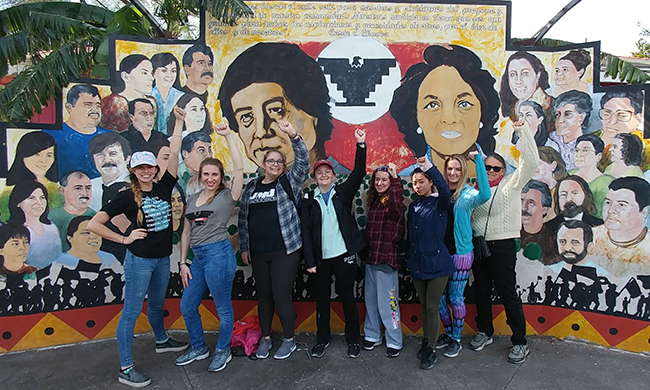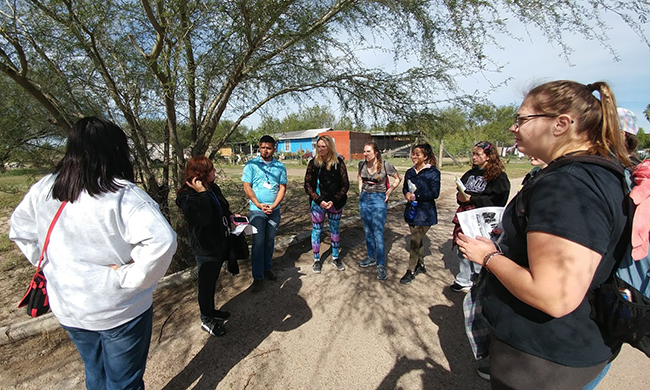Students travel to US-Mexico border for service-learning opportunity
NewsBy: Laura Mack
Creative Services Student Writer

Over winter break, eleven students and a faculty member coordinated a service-learning trip to San Juan, Texas, a city located along the U.S.-Mexico border, to learn more about the complexities of immigration and the common experiences of people crossing the border. While students from varied academic backgrounds attended, trip efforts originated with Cindy Hunter’s class on social work with immigrants and refugees. Hunter wanted to provide a hands-on learning opportunity to complement course content, and two of her students, Jamie Danyko and Kate Formeller, were selected to plan the trip with the JMU office of Community Service-Learning (CS-L).
CS-L put students in contact with an organization in San Juan they had worked with previously: La Union Del Pueblo Entero, or LUPE, a community union that supports and empowers low-income communities in the San Juan area. Danyko and Formeller determined budgeting and travel arrangements with CS-L, and LUPE organized the activities and programming for the five days that students would volunteer with them.
On the first full day, the group worked with Catholic Charities at a receiving center for people who had just crossed the border. “These were adults that had a minor in tow, and when they came over the border, they pretty much gave themselves to border patrol,” explained Hunter. When ICE releases them from detention, they are dropped off at a bus station – however, they might not have money for a bus ticket, or access to a phone. Catholic Charities transports people from the bus station to their receiving center, where they provide a hot meal, clean clothes and phone service. “It could very well have been the first time on their journey that people received them kindly,” Hunter added.
Students prepared meals, set aside clothes, and connected people with Catholic Charities staff throughout the day. They found it to be a humbling experience and were particularly in awe of the care Catholic Charities brought to small, yet powerful tasks. “Because people may not have had a meal in a while, the staff made sure that we prepared food as best as we possibly could. This included even patting down lunchmeat before placing it on bread, so that their sandwiches wouldn’t be soggy,” said Danyko. “You have to really care to consider those little things.”
To demonstrate LUPE’s mission, one of the coordinators gave a tour of and provided volunteering opportunities with the colonias. “Colonias are rural areas where people sold off land, and then workers built homes on them,” Hunter explained. “The houses people build are substandard, and these communities don’t have access to common amenities like street lighting or drainage.” LUPE’s approach is not just to provide aid, but to galvanize residents to take charge of their communities. “I was so impressed because their biggest thing is that they want community members to be the leaders,” said Danyko. “Many nonprofits don’t work like that. LUPE makes it feasible to do a little bit of everything.”

Students also helped LUPE prepare for a press conference related to empowering the colonias. In 2005, FEMA failed to support rebuilding efforts after a hurricane destroyed the colonias, explaining that the buildings were not up to standard even prior to the hurricane. LUPE sued FEMA on behalf of the colonias, and this press conference marked the reparations that FEMA finally agreed to pay towards affected residents. Students decorated a large banner to hang behind speakers at the conference.
Participants discussed how these first-hand experiences enabled them to more fully understand the process of immigration. Even Hunter, who lived with her family in El Salvador for 5 years, came away with a different picture of immigration. “I knew folks who shared these harrowing experiences crossing the border, but I had a hard time imagining their journey – which was made real to me by listening to the stories of people at the receiving center and by standing at the border and watching the faces of people who walked through those doors and got on the bus,” Hunter explained. “To me, it was a journey that I heard a lot about, but the experience of being there made an important link to me as an advocate for immigrants.”
Because of the trip, students also felt that they could be better advocates for immigrants and refugees back home. Danyko and Formeller both expressed important connections to their future careers in social work, bolstering their ability to connect people to key resources and build awareness about immigration in Harrisonburg. “I’m currently doing my practicum with the Church World Service Harrisonburg Immigration and Refugee Resettlement Office working with those with refugee status,” explained Formeller. “And what I’ve learned is that you might not be able to feel passionate about social justice until you are connected with it on a personal level. The trip helped us gain firsthand service experiences, which humanized their stories and these injustices.”

